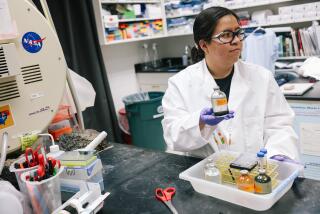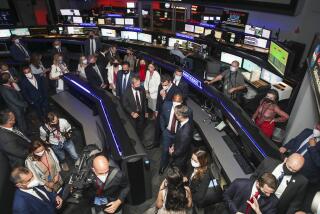JPL Helps Out Businesses, and That’s Cool
- Share via
When the Food and Drug Administration required eggs to be kept colder in refrigerated cases, a manufacturer of open-air cases got help from an unexpected source: the Jet Propulsion Laboratory in Pasadena.
“We found out that JPL’s engineers would come out and look at the plant and help us,” said Suzanne Fredericks, president of Displaymor Inc.
The Los Angeles company, which makes refrigerated cases for supermarkets and other outlets, took advantage of a JPL program that helps big and small businesses solve tough technical problems.
A JPL team analyzed the flow of air through the open refrigerated cases and helped the company redesign the thermal coils to improve their cooling capacity. JPL technologists also recommended a software program that enables Displaymor’s engineers to work on new and better refrigerated case designs.
You might think JPL helps only high-tech or aerospace companies, but that’s not the case. Fewer than 18% of the companies seeking help from the lab are in the aerospace industry and more than half of the companies seeking help from JPL’s Commercial Technology Program are small businesses, JPL said. The fees vary according to the work that needs to be done.
JPL, operated by Caltech for the National Aeronautics and Space Administration, has shared its breakthroughs with the commercial sector for years by encouraging the private sector to take advantage of its $1-billion research budget.
Many people don’t realize that space technology has reached consumers in the form of Tang instant drinks, Velcro fasteners and infrared ear thermometers found in homes and doctors’ offices.
“If a company is having a technical problem and needs help quickly, they can have access to our technologists for a fee,” said Alice Wessen, JPL’s outreach coordinator.
A JPL technologist will let you know very quickly whether the team can help you solve your problems. The commercial technology program has also streamlined the contract process to make it quicker and easier for entrepreneurs to get help.
Bob Severino, a pilot whose friend died in a small-plane crash, worked with JPL scientists to develop a collision-avoidance system for small planes. The system is designed to work on a laptop computer. The Severino & Dubbs Inc. system runs six screens of data in a Microsoft Windows environment. Severino and Kimberly Dubbs, his chief financial officer, both worked at Hughes Aircraft before founding their Irvine-based company.
They also applied for and received a federal small-business research grant, which helped them pay for JPL’s help.
“The government pays you to pay for federally funded research at a development facility or university,” Severino said.
Through the small-business technology transfer program, the research facility receives 40% of the funds and the company keeps 60%.
To find out more about the services offered by JPL’s Commercial Technology Program, call (818) 354-2503, or fax (818) 393-4093. Or check out its Internet site at https://techtrans.jpl.nasa.gov/tu.html.
*
Jane Applegate can be reached via e-mail at janeapplegate@mindspring.com. Reporting assistance by Robin Wallace.
More to Read
Inside the business of entertainment
The Wide Shot brings you news, analysis and insights on everything from streaming wars to production — and what it all means for the future.
You may occasionally receive promotional content from the Los Angeles Times.










